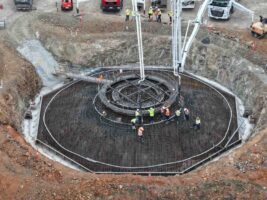
Facing certain defeat in the next election, the hard right rump of the governing Coalition government (that’s more than half the party), are making a last ditch attempt to reverse the course of technology and have the government fund new coal-fired generators.
A newly-named “ginger group” known as the Monash Forum has burst from the bleechers to put the case for coal, arguing – despite all evidence to the contrary – that new coal-fired generation is the key to restoring low power prices.
Newspaper reports suggest more than half of the Coalition back bench are behind this move for more coal – which is consistent with other estimates that put the percentage of Coalition MPs and Senators who don’t accept climate science at around the same level.
The push for more coal, and the rejection of climate evidence, goes hand in hand.
This new push – announced across the spectrum of Murdoch media (Sky News, the front pages of The Australian, The Daily Telegraph and in other News Ltd tabloids) is designed to put pressure on prime minister Malcolm Turnbull and is led by the usual noisy group of climate science deniers and coal industry boosters – Craig Kelly, Tony Abbott, Barnaby Joyce, George Christensen, Eri Abetz, Kevin Andrews et al.
It comes amid a major new advertising campaign from the coal industry on television and other media, and comes as the Energy Security Board prepares its latest version of the proposed National Energy Guarantee that will be presented to COAG energy ministers in a fortnight.
That’s the interesting part of this push. The NEG was designed specifically with the Coalition back-bench in mind, as we reported (again) last week in our story Who is Turnbull trying to fool with the NEG.
The NEG’s official modelling promised to extend the life of the coal fired power stations, bring investment in renewables to an effective halt, and lock in an emissions reduction target for the electricity sector that would actually be worse than doing nothing.
The emergence of the Monash Forum – named after John Monash, the former Gallipoli commander and the man credited for helping develop coal-fired generation in Victoria – appears deliberately timed to ensure that the Coalition doesn’t flag from its endeavours to ensure the NEG is a “do nothing”, or even a “do less” policy.
Kelly, the chairman of the backbench committee on energy and climate who has led the Hard Right’s demonisation of everything modern – wind and solar farms, battery storage, demand management and electric vehicles – is once again at the forefront.
His appearances on Sky TV on Monday night and ABC Radio National on Tuesday sought to justify the Monash Forum’s nostalgia for coal on two lies that neither media organisation challenged: the level of subsidies for renewables in Australia and the push for new coal generation around the world.
Kelly, indeed the Coalition as a whole and the Murdoch media in particular, continue to prosecute the line that renewable energy depend on $60 billion in subsidies, and Kelly said this amounted to $3.6 billion this year alone.
Of course, this is pure fiction, and has been repeatedly disproved. As is the claim, made by Kelly again, that 40 new HELE (high emissions, low efficiency) coal generators are being built in Japan, and 600 around the world.
In fact, none has been completed since Fukushima, according to Simon Holmes a Court, from the Energy Transition Hub. Global data suggests the pace of new coal fired generation is slowing dramatically, for economic and environmental reasons.
But even the so-called moderates are being caught up with this: The Nationals deputy leader, Bridget McKenzie, who sought to justify the Monash Forum’s position this way: “We’re not going to get ideological about this … we are going to let the science inform our policy, that’s a real change for us.”
Trumpian indeed.

Of course, if the Coalition had not become ideological, and if it had respected the science, then Australia would still have a carbon price, and not celebrated its demise with such glee (photo above).
The country would also be on downward trend on emissions, would not have stuffed around with the renewable energy target and would now have a workable plan to usher in the enery transition, and would have significantly lower energy prices than it has now.
And it would be on a path to content to deal with the other emissions impact of coal fired generators, such as the huge increase of dangerous fine particle pollution (PM2.5) from the largest power stations. (McKenzie is minister for Rural Health, so should be concerned).
But, because of its ideology, and its demonisation of climate science and climate scientists, and modern technology, Australia has no policy, but a “backbone” of a new idea that appears to serve no other purpose than to bow to the hard right.
Kelly’s comments on the NEG were interesting – he supported it in principle, but conceded there was actually no flesh (or “parameters”, as he put it) on the backbone. But he wanted it to ensure that new coal fired generators were built.
Indeed, according to Sky News, the Monash Forum’s demands are based on a new $4 billion coal fired generator in the Latrobe Valley, a Hazelwood 2.0. If the government wants Snowy 2.0, then why not Hazelwood 2.0?
It’s true that there is no flesh on the bone with the NEG, but Kelly’s insistence that it should be of a certain colour was quickly heeded by energy minister Josh Frydenberg, who said that the NEG was “an opportunity that’ can’t be missed …. to get the best investment signals at the right place and the right time.”
This has been the line of the lobby groups supporting the NEG since it was hurriedly unveiled late last year – that this is the best policy that can be expected given the majority of one of the two big mainstream parties simply does not accept climate science or modern engineering.
The ultimatum to Labor, and the Labor states is clear – accept this, or the Coalition will continue to accept nothing that even looks like clearing the path for lower emissions and new technologies.
“I’m not pro coal, not anti coal,” Frydenberg insisted. “I’m not pro renewables, I’m not anti renewables …. What I am in favour of is lower energy prices and a more reliable energy system.”
But he then went on to say that the NEG would provide opporutnituies for coal oupgrades, and for coal to be important part of the energy mix.
“It puts a premium on reliable dispatchable power and that is something that coal does provide,” he told journalists. “I’d be please to see coal continue and for more investments in coal fired power stations – whether they be upgrades or others.”
Turnbull on Tuesday said the NEG would put a premium on 24/7 power – and coal could provide that. He said the NEG was a “real breakthrough” that would deliver affordable, reliable power. He said it had received strong support from industry and government.
But as the submissions from more than 100 industry players have made clear – the NEG as currently envisioned will deliver neither lower energy prices nor a more reliable energy system. There are massive questions, and not just because there is no flesh.
Turnbull said the NEG would put a premium on 24/7 power – and coal could provide that. He said the NEG was a “real breakthrough” that would deliver affordable, reliable power.
“This is a test of Malcolm Turnbull’s leadership, but given his track record of failing to stand up to the hard right of his party room and caving in on two energy policies, no one should be surprised if he caved into the hard right fossils again,” Labor energy spokesman Mark Butler said.
“Malcolm Turnbull’s inability to rein in his party room exemplifies the chaos which has surrounded his leadership over the energy crisis.
“All while household and business power bills continue to skyrocket, while pollution under this out of touch government continues to go up, and up, and up.”
His comments were echoed by John Grimes, of the Smart Energy Council, who noted the NEG was a recipe for delay and inaction on renewable energy and climate change.
“We need smart national energy policy – strong support for solar, storage and renewable energy and strong action on climate change,” he said in a statement.
“If you are aggressively supporting coal, you are not supporting smart energy policy – and Australia is not meeting its international climate change commitments.”









